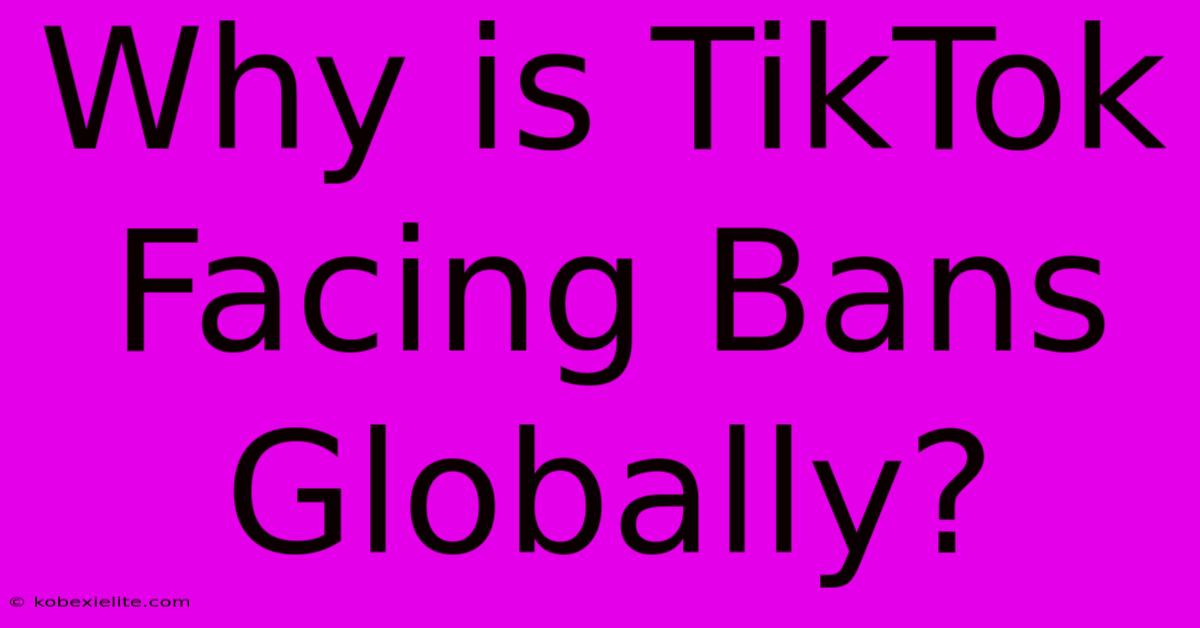Why Is TikTok Facing Bans Globally?

Discover more detailed and exciting information on our website. Click the link below to start your adventure: Visit Best Website mr.cleine.com. Don't miss out!
Table of Contents
Why is TikTok Facing Bans Globally? A Deep Dive into Geopolitical Concerns and Data Privacy
TikTok, the wildly popular short-form video app, has become a global phenomenon, captivating billions with its addictive content. However, this meteoric rise has also brought intense scrutiny, leading to bans and restrictions in various countries. This isn't simply about a few disgruntled users; it's a complex issue involving national security concerns, data privacy anxieties, and the growing geopolitical tensions between China and the West.
The Core Concerns Fueling TikTok Bans
The primary reasons behind the global pushback against TikTok center around two key areas:
1. Data Security and Privacy:
-
Access to User Data: A significant concern revolves around TikTok's ownership by ByteDance, a Chinese company. Many governments fear that the Chinese government could potentially access user data through ByteDance, posing a risk to national security and individual privacy. This includes potentially sensitive information like user location, browsing history, and even communications. The opaque nature of data handling practices within ByteDance further fuels these anxieties.
-
Data Transfer and Storage: The location of user data is another crucial aspect. Concerns exist regarding whether user data is stored in China, subject to Chinese laws and potentially accessible to the Chinese government. This contrasts sharply with data protection regulations in many Western countries, which impose strict rules on data handling and transfer.
-
Algorithm Transparency: TikTok's algorithm, responsible for curating the content users see, remains largely a "black box." This lack of transparency raises concerns about potential manipulation, censorship, and the dissemination of misinformation or propaganda.
2. National Security and Geopolitical Tensions:
-
Influence and Propaganda: There are worries that TikTok could be used to spread propaganda or influence public opinion, particularly during elections or times of geopolitical instability. The potential for foreign interference through social media platforms is a serious concern for many governments.
-
Espionage Risks: Some argue that TikTok could be used as a tool for espionage, with access to user data potentially revealing valuable intelligence. This fear is particularly heightened in the context of the ongoing geopolitical rivalry between China and the West.
-
Control and Censorship: The fear of censorship is another factor. There are concerns that the Chinese government could pressure ByteDance to censor content that is critical of the Chinese government or its policies, leading to a skewed information environment.
The Global Landscape of TikTok Bans and Restrictions:
While outright bans are relatively uncommon, numerous countries have implemented restrictions or are actively considering them. These include:
- India: India banned TikTok in 2020, citing security concerns.
- USA: While not fully banned, TikTok faces intense scrutiny and has been the subject of multiple investigations and proposed legislation aimed at restricting its operations.
- Europe: Several European countries are examining potential regulations, focusing on data privacy and security.
What's Next for TikTok?
The future of TikTok remains uncertain. ByteDance has made several efforts to address security concerns, including proposing data security agreements and pledging to store US user data on US servers. However, many governments remain skeptical, and the ongoing geopolitical tensions add another layer of complexity. The coming years will likely see a continued battle between TikTok's desire to maintain its global reach and the concerns of governments prioritizing national security and data privacy. The outcome will significantly impact not only TikTok itself but also the broader landscape of social media regulation and international relations.
Keywords: TikTok ban, TikTok restrictions, data privacy, national security, China, ByteDance, geopolitical tensions, social media regulation, algorithm transparency, censorship, data security, US TikTok ban, India TikTok ban, European TikTok regulations.

Thank you for visiting our website wich cover about Why Is TikTok Facing Bans Globally?. We hope the information provided has been useful to you. Feel free to contact us if you have any questions or need further assistance. See you next time and dont miss to bookmark.
Featured Posts
-
Back In Action Diazs Netflix Flop
Jan 18, 2025
-
Pogacar Eyed For Tour Down Under
Jan 18, 2025
-
Australian Open Paolini V Svitolina
Jan 18, 2025
-
Noems Homeland Security Chief Hearing Recap
Jan 18, 2025
-
Premier League Haalands Winning Goal
Jan 18, 2025
